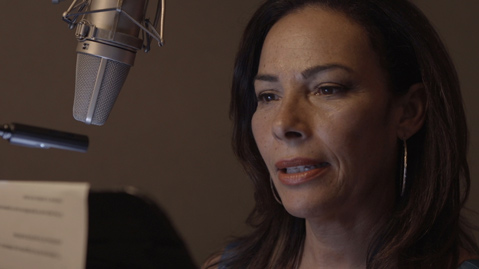Now En Español
Director Andrea Meller

For being an integral tool in how millions of Spanish-speaking viewers watch popular television shows like Desperate Housewives, the women who dub these lines into español aren’t definitely not afford glamorous treatment by the industry. This documentary lays bare the tough realities that these women face, though does so in a fun-loving and caring way.
See vimeo.com/andreameller/nowtrailer.
How did you come across this story?
I read an article about the actresses in 2005, when ABC decided to offer all of its primetime programming in Spanish, either through dubbing or subtitling. I was impressed by ABC’s acknowledgement of the demographic shifts happening in our country. Their decision to offer programs in Spanish was a real demonstration of the growing Latino market. But it had a catch…the acknowledgement still felt behind-the-scenes. It reminded me of the 1940s when black actresses would provide the singing voices for white actresses onscreen. It felt like a major acknowledgement but with severe limitations.
At the time, I was still working on a documentary about people transitioning out of prison back into New York City in which the main protagonists were all Latino. It was a great film and an important story to tell, but I felt the need after working on that film to tell a different “Latino” story that wasn’t about crime or poverty. I saw making a film about the dubbing actresses as an opportunity to tell a very different, more celebratory and more diverse, story about Latinos in the US that also put them on-screen.
And finally on a much more personal level, growing up in N.Y. as a white woman with immigrant parents from Chile, I really didn’t understand what being Latina meant. Reading the article, I thought “here are women that every day at work have to deal with other people’s definitions of what it means to be Latina” – “you’re too white to be Latina,” “you’re too dark to be Latina,” “you have too much of an accent,” “you don’t have enough of an accent.” I was fascinated by the idea that there are people out there deciding what Latina means and I wanted to explore that idea. So it was also partially a personal venture.
That’s a very long-winded response, but really all of those things were going through my head – my personal reaction to the question of what it means to be a Latina, the limited acknowledgement of the growing Latino community in the US, and the opportunity to celebrate and tell a different kind of Latino story.
For the pay they get ($20 an hour) versus the mutli-million dollar projects they work on, they seem very much exploited. Is there any progress in getting more equitable pay?
I am not an expert on this part of the story, so I have to be clear that this is just my understanding regarding the disparity in pay.
In my opinion, compared to other voice work these actresses do, the $20 an hour pay rate is ridiculous. They are doing the same work, it takes the same amount of skill, talent, and time; it just happens to be in another language. But the fact that the dubbing work is a union job is a major accomplishment. So while the work doesn’t pay as much as other jobs, the actresses still get points towards their health insurance and union requirements which is extremely helpful.
I think that it’s a tricky situation because dubbing actors want more jobs and for the new work to fall under union contract. So there’s a debate about how much more people can ask for without putting future work or even the jobs that already exist at risk. The Screen Actors Guild (SAG), which is the union that covers the dubbing work, did a study while we were filming that showed how popular the Spanish versions of the televisions shows were. I think that’s been more of the focus at the moment – making sure that people understand that this work has a market and that dubbing is well made in the US so that more jobs are created and kept within the country.
Does it seem like there are more on camera roles opening for Latinas of all types?
I think that we’re experiencing a very exciting moment in television right now with several programs that have a ton of Latino characters, like “Jane the Virgin” and “Cristela.” There are Latinas without accents, with accents, with different looks. I’m not sure if the same is true of movies. But honestly, I don’t know how long it will last. It feels like this has happened before, with “Ugly Betty” and “The George Lopez Show” and that when the shows end, Latino representation disappears for a while.
So while representation is definitely improving, TV and movies still do not have the diversity that we see in this country, in-front of and behind the camera. I am curious to see what happens as awareness grows of the importance of diversity of representation, both in the quantity and the type of roles. It feels like a lot of young adult programming has more diversity, so that might translate into more representation as that generation gets older.
How are they doing now?
The actresses are doing well, though as they say in the movie, their lives are like rollercoasters. Because I was filming during the recession, I definitely caught the majority of them at a fairly hard time in their careers. I think things have calmed down since I finished filming, but their lives continue to have ups and downs, personally and in their careers. It’s pretty similar to being a filmmaker. But I think the most exciting news, without giving too much away, is that Gabriela, the actress from Uruguay, is hard at work creating a whole new community of dubbers.



